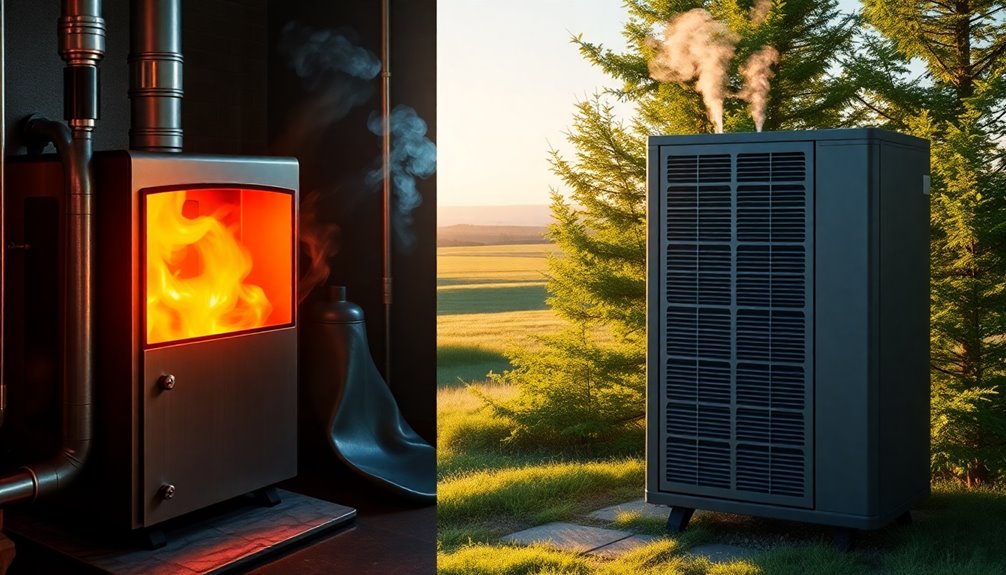If you're deciding between heating with oil or a heat pump, you'll likely find that a heat pump is often cheaper and more efficient. Heat pumps can produce three times the heat energy compared to the electricity they use, leading to notable savings on energy bills. While the installation costs for heat pumps may seem higher, their long-term savings and lower operating costs can quickly offset that. Plus, they contribute to a healthier environment by reducing emissions. There's a lot more to evaluate regarding efficiency and long-term benefits, making it worth exploring all the angles.
Overview of Heating Options
When deciding how to heat your home, you've got a couple of solid options: heat pumps and oil furnaces. Both systems come with their own set of advantages and challenges.
Heat pumps stand out for their energy efficiency, boasting a Coefficient of Performance (COP) of up to 4, which means they can produce four times the energy they consume. In contrast, oil furnaces average around 85% efficiency. This high efficiency contributes to lower operational costs over time, making heat pumps a more cost-effective choice for many homeowners. Additionally, utilizing budgeting apps to track heating expenses can help homeowners manage their overall energy costs more effectively.
When it comes to installation costs, heat pumps range from $7,120 to $36,000, while oil furnaces typically cost between $6,400 and $9,200. Although the initial costs of heat pumps can be higher, they often lead to lower operational costs.
For instance, a heat pump requires about 293.1 kWh to produce 1 million BTUs, costing around $29.31, compared to $36.96 for an oil furnace.
Moreover, switching from an oil furnace to a heat pump can't only save you about $846 annually on fuel prices but also greatly reduce carbon emissions—up to 7.6 metric tons per year. Additionally, choosing sustainable delivery practices can further enhance your eco-friendly efforts in home heating solutions.
Efficiency Comparison
Evaluating efficiency between heating options reveals considerable differences in performance and cost-effectiveness.
Oil heating typically operates at an efficiency rating of around 85%, while heat pumps can achieve a Coefficient of Performance (COP) of 3.0 or higher. This means a heat pump can generate three times more heat energy than the electricity it consumes, making it a highly efficient choice. Additionally, using budget management tools like YNAB (You Need A Budget) can assist homeowners in planning for energy expenses effectively. By utilizing budgeting apps, users can gain insights into their overall spending, allowing them to allocate more funds towards energy-efficient solutions.
Under ideal conditions, heat pumps can exceed 400% efficiency, though performance may drop in extreme cold, approximately to 250% at 32°F.
When you look at fuel costs, an oil furnace requires about 7.22 gallons of oil to produce 1 million BTUs, while a heat pump needs around 293.1 kWh for the same output.
Regarding cost per million BTUs, oil heating costs about $36.96, while heat pumps are much cheaper at around $29.31.
These differences in efficiency and cost per million BTUs highlight the potential cost savings with heat pumps. Additionally, using budget apps can further enhance financial awareness, allowing homeowners to track and manage their energy expenses effectively.
Plus, while oil heating's operational costs can fluctuate with fuel prices, heat pumps benefit from more stable electricity rates, making them a more economical choice over time.
Cost Analysis

The cost analysis of heating options reveals stark contrasts that can greatly impact your budget. When considering heating systems, you'll find that fuel oil and heat pumps offer different financial implications.
- Oil furnaces need about 7.22 gallons of oil to produce 1 million BTUs, costing around $36.96 per million BTUs after efficiency adjustments.
- In contrast, an air source heat pump requires about 293.1 kWh, costing approximately $29.31 per million BTUs when adjusted for efficiency.
- While the installation costs for heat pumps range from $7,120 to $36,000, oil furnace installations are generally cheaper at $6,400 to $9,200. Additionally, utilizing automated investment management tools can help you strategically allocate savings from heating costs towards long-term investment growth. Budgeting for financial goals can enhance your overall financial planning by ensuring that you have enough resources for essential expenses.
Despite higher initial costs, heat pumps can lead to significant savings over time. For instance, switching from fuel oil can save you around $846 annually, thanks to their impressive Coefficient of Performance (COP) of up to 3.0, signifying they produce three units of heat for every unit of energy consumed.
This efficiency can make heat pumps a more cost-effective choice in the long run, despite their upfront investment. Additionally, utilizing investment tracking tools can help you assess the long-term financial implications of your heating choice. Consider your heating needs carefully to make the best financial decision.
Environmental Impact
Although heating with oil has been a traditional choice for many homeowners, its environmental impact is becoming increasingly concerning. Oil furnaces contribute considerably to greenhouse gas emissions, with an annual carbon footprint of about 20,000 pounds of CO2 for a standard home.
In contrast, heat pumps can reduce emissions by up to 7.6 metric tons per year when replacing oil heating systems, making them a more sustainable option. Choosing heat pumps aligns with the principles of sustainable fashion which prioritize eco-friendly practices and support a healthier planet. Additionally, the use of sustainable materials in manufacturing these systems helps to minimize their overall environmental footprint.
Heat pumps utilize electricity, and when powered by renewable energy sources, they can achieve nearly zero emissions. This shift not only lowers your carbon footprint but also enhances efficiency. With a Coefficient of Performance (COP) that can reach up to 4, heat pumps produce four units of heat for every unit of electricity consumed, leading to reduced energy consumption and environmental impact.
Transitioning to heat pumps also helps decrease reliance on fossil fuels. They operate efficiently even in colder climates, thanks to advancements like hyper heat technology, which maintains efficiency down to -15°F. Additionally, by choosing heat pumps, consumers can support sustainable businesses that prioritize eco-friendly practices and contribute to a healthier planet.
Future Considerations

When considering your heating options for the future, it's essential to weigh both the long-term costs and environmental benefits. While oil heat may seem familiar, the rising fuel costs and installation costs for heat pumps make them an increasingly viable choice.
Here are some factors to keep in mind:
- Efficiency of heating: Heat pumps have a Coefficient of Performance (CoP) that often exceeds 4, meaning they can provide more heat energy than the electrical energy they consume. Additionally, AI-driven tools can help identify the most efficient heating solutions based on your specific needs. Many expense tracking tools can also assist in monitoring and managing the costs associated with heating.
- Installation costs: Though heat pump installation can range from $7,120 to $36,000, incentives can lower that average to about $16,025, making it more affordable over time.
- Climate conditions: Consider your local climate, as extreme cold may require supplemental heating, impacting overall costs.
As you evaluate your options, think about how shifting to a heat pump can lower your energy bills and greatly reduce your carbon footprint—by approximately 7.6 metric tons annually. Additionally, implementing a centralized system for tracking bills can help manage new energy costs effectively.
Ultimately, the choice between oil heat and heat pumps hinges on balancing upfront costs with long-term savings and environmental impact.
Conclusion
To sum up, while heating oil may seem cheaper upfront, heat pumps can save you more in the long run due to their efficiency. Did you know that heat pumps can be over 300% more efficient than traditional oil heating systems? By considering both costs and environmental impact, you're making a smarter choice for your wallet and the planet. So, when it's time to heat your home, think about switching to a heat pump for substantial savings!



